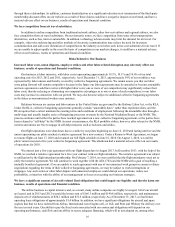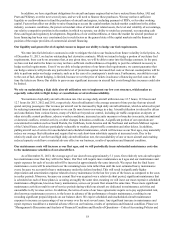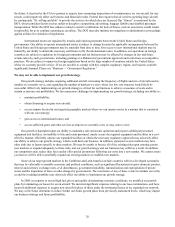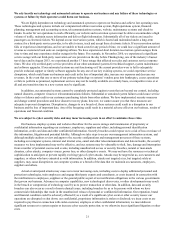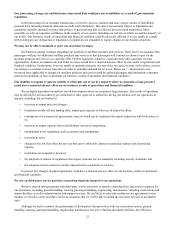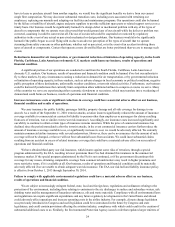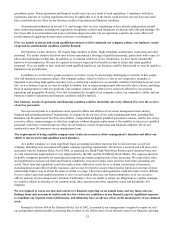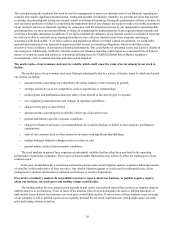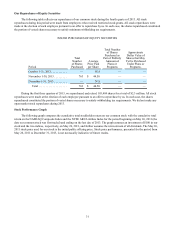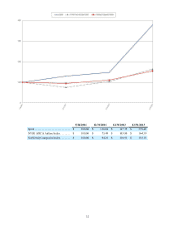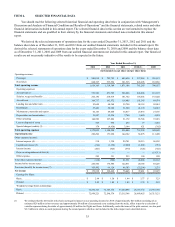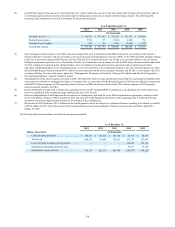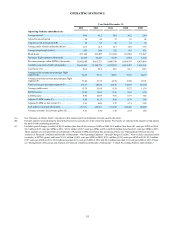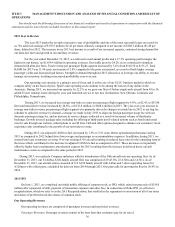Spirit Airlines 2013 Annual Report Download - page 26
Download and view the complete annual report
Please find page 26 of the 2013 Spirit Airlines annual report below. You can navigate through the pages in the report by either clicking on the pages listed below, or by using the keyword search tool below to find specific information within the annual report.26
The rules governing the standards that must be met for management to assess our internal control over financial reporting are
complex and require significant documentation, testing and possible remediation. Annually, we perform activities that include
reviewing, documenting and testing our internal control over financial reporting. During the performance of these activities, we
may encounter problems or delays in completing the implementation of any changes necessary to make a favorable assessment
of our internal control over financial reporting. In connection with the attestation process by our independent registered public
accounting firm, we may encounter problems or delays in completing the implementation of any requested improvements and
receiving a favorable attestation. In addition, if we fail to maintain the adequacy of our internal control over financial reporting
we will not be able to conclude on an ongoing basis that we have effective internal control over financial reporting in
accordance with Section 404. If we fail to achieve and maintain an effective internal control environment, we could suffer
material misstatements in our financial statements and fail to meet our reporting obligations, which would likely cause
investors to lose confidence in our reported financial information. This could harm our operating results and lead to a decline in
our stock price. Additionally, ineffective internal control over financial reporting could expose us to increased risk of fraud or
misuse of corporate assets and subject us to potential delisting from the NASDAQ Global Select Market, regulatory
investigations, civil or criminal sanctions and class action litigation.
The market price of our common stock may be volatile, which could cause the value of an investment in our stock to
decline.
The market price of our common stock may fluctuate substantially due to a variety of factors, many of which are beyond
our control, including:
• announcements concerning our competitors, the airline industry or the economy in general;
• strategic actions by us or our competitors, such as acquisitions or restructurings;
• media reports and publications about the safety of our aircraft or the aircraft type we operate;
• new regulatory pronouncements and changes in regulatory guidelines;
• changes in the price of aircraft fuel;
• announcements concerning the availability of the type of aircraft we use;
• general and industry-specific economic conditions;
• changes in financial estimates or recommendations by securities analysts or failure to meet analysts’ performance
expectations;
• sales of our common stock or other actions by investors with significant shareholdings;
• trading strategies related to changes in fuel or oil prices; and
• general market, political and economic conditions.
The stock markets in general have experienced substantial volatility that has often been unrelated to the operating
performance of particular companies. These types of broad market fluctuations may adversely affect the trading price of our
common stock.
In the past, stockholders have sometimes instituted securities class action litigation against companies following periods
of volatility in the market price of their securities. Any similar litigation against us could result in substantial costs, divert
management’s attention and resources and harm our business or results of operations.
If securities or industry analysts do not publish research or reports about our business, or publish negative reports
about our business, our stock price and trading volume could decline.
The trading market for our common stock depends in part on the research and reports that securities or industry analysts
publish about us or our business. If one or more of the analysts who cover us downgrade our stock or publish inaccurate or
unfavorable research about our business, our stock price would likely decline. If one or more of these analysts cease coverage
of our company or fail to publish reports on us regularly, demand for our stock could decrease, which might cause our stock
price and trading volume to decline.


